Interesting Things Elsewhere
About Andrew Cusack
 Writer, web designer, etc.; born in New York; educated in Argentina, Scotland, and South Africa; now based in London.
Writer, web designer, etc.; born in New York; educated in Argentina, Scotland, and South Africa; now based in London. read more
News
Blogs
Reviews & Periodicals
Arts & Design
World
France
Mitteleuropa
Knickerbockers
Argentina
The Levant
Africa
Cape of Good Hope
Netherlands
Scandinavia
Québec
India
Muscovy
Germany
Academica
Articles of Note: 13 March 2024
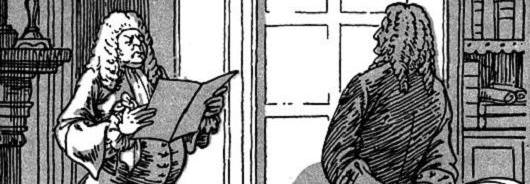
My then-flatmate was getting married the next day and much pottering-about sorting things was required but the idiosyncratic beauty of this building captured my imagination — part Norman, part Moorish. I was almost insulted that I hadn’t come across it in any of my bookish explorations.
The historian Edmund Harris covers Chideock in his lusciously illustrated post on Recusancy in Dorset and the ‘other tradition’ of Catholic church-building.
■ Generations ago it was said that the three institutions no British politician dared offend were the trade unions, the Catholic Church, and the Brigade of Guards. In 2020s Britain there is only one caste which must always be obeyed: the ageing, moneyed homeowners.
Not only do these “NIMBYs” (“Not In My Back Yard”) jealously guard their freeholds, they do whatever they can to prevent more houses being built to guard the value of their prize possessions, vastly inflated by a combination of lacklustre housebuilding and irresponsible leap in migration. As old people vote and young people don’t — and when they do, vote badly — few sensible people can find a way out of this quagmire.
It might be worth looking to the Mediterranean, where Tal Alster tells us How Israel turned urban homeowners into YIMBYs.
■ It’s disappointingly rare to see intelligent outsiders give a considered impression of the current state of play in the Netherlands — that’s Mother Holland for us New Yorkers. Too often commentators in English are either rash cheerleaders for the hard right or bien-pensant liberals eager to castigate and chastise. Both rush to judgement.
What a rare diversion then to read Christopher Caldwell — the only thinking neo-con? — attempt to explore and explain the success of Geert Wilders in the recent Dutch elections.
■ One in ten of Lusitania’s inhabitants are now immigrants, and this discounts those — many from Brazil and other former parts of the once-world-spanning Portuguese empire — who have managed to acquire citizenship through various routes.
Ukrainian number-plates are now frequently be seen on the roads of Lisbon, as far in Europe as you can get from Big Bad Uncle Vlad.
Vasco Queirós asks: Who is Portugal for?
■ Speaking of world-spanning empires, in true andrewcusackdotcom fashion, we haven’t had enough of the Dutch — but we have had enough of their wicked wayward heresies.
Historian Charles H. Parker explores the legacies of Calvinism in the Dutch empire.
■ The City of New York itself is the best journalism school there is. Jimmy Breslin dropped out of LIU after two years, eventually taking up his pen. Pete Hamill left school at fifteen, apprenticed as a sheet metal worker, and joined the navy.
William Deresiewicz argues that a dose of working-class realism can save journalism from groupthink.
■ The New Yorker tells us how a Manchester barkeep found and saved a lost (ostensible) masterpiece of interwar British literature.
■ Our inestimable friend Dr Harshan Kumarasingham explores David Torrance’s history of the first Labour government on its hundredth anniversary.
■ And finally, one for nous les normandes (ok, ok, celto-normandes): Canada’s National Treasure David Warren briefly muses that the Norman infusion greatly refined Anglo-Saxon to give us the superior English tongue we speak today.
Articles of Note: 29 January 2024

A lively Doubleyoo-Ess once took me to lunch at the New Club and, in whispered tones, pointed out a gentleman sitting at another table.
“He is the world’s leading expert on the Scots tongue,” my friend explained.
“But he was excommunicated by all the other experts on Scots when he pointed out that eighty per cent of Scots words are interchangeable with Northumbrian English.”
Scots is fascinating for its closeness to English and its distinction. Those who’ve had the pleasure of tarrying awhile in the Netherlandic world (whether in Europe, the Cape of Good Hope, or elsewhere) can detect the odd affinities to Dutch and Afrikaans — reminding you that the North Sea was once a highway, not a barrier.
Luka Ivan Jukic has written an enlightening exploration of how and why Scotland lost its tongue.
Jukic contends there are no signs of revival, which I dispute. There is a much increased interest in the use of Scots, but it feels contrived and falls somewhat flat. If you take a look at the Scots column in The National newspaper, it comes across as the ravings of a kook something akin to Anglish.
■ Amongst the many of Scotland’s joys is the pleasure of just looking at its buildings.
Witold Rybczynski pleads “Give us something to look at!” in his account of why ornament matters in architecture.
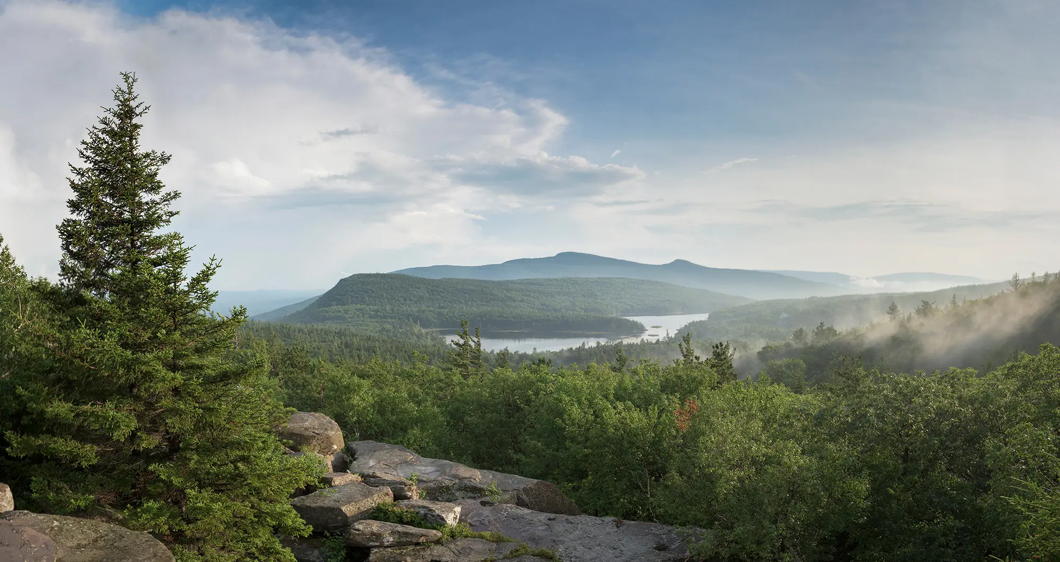
■ The New York Post — founded by Alexander Hamilton in 1801 and thus the Empire State’s oldest and most venerable newspaper — reports that the world’s oldest and most venerable forest has been discovered right in the heart of the Catskill Mountains.
This is one of the most beautiful places in America, especially when the leaves begin to turn in autumn, and features widely in the old stories transcribed by Washington Irving and others.
The name of the Catskills is believed to be from the catamounts that used to roam the woods and bergs when our Dutch forefathers of old first arrived in the valley of the Hudson. Our earliest record of it is on a map by Nicolaes Visscher père from 1656 — and pleasingly the local magazine retains the old spelling in its name of Kaatskill Life.
This fossilised forest within the Catskills is believed to date from 385 million years ago (for those who doubt the Ussher chronology — and we remain open-minded ourselves) and was discovered at the bottom of an old quarry.
■ As a precocious teenager I remember a visit to the maritime museum in Rochefort on France’s Atlantic coast that included a fascinating display of the intricacies and accomplishments of global shipping, housed in the long old ropeworks that kept France’s navy afloat in the era of sail.
It’s all been kicking off in the Red Sea, which inspired Wessie du Toit to write that the shipping container is an uncanny symbol of modern life
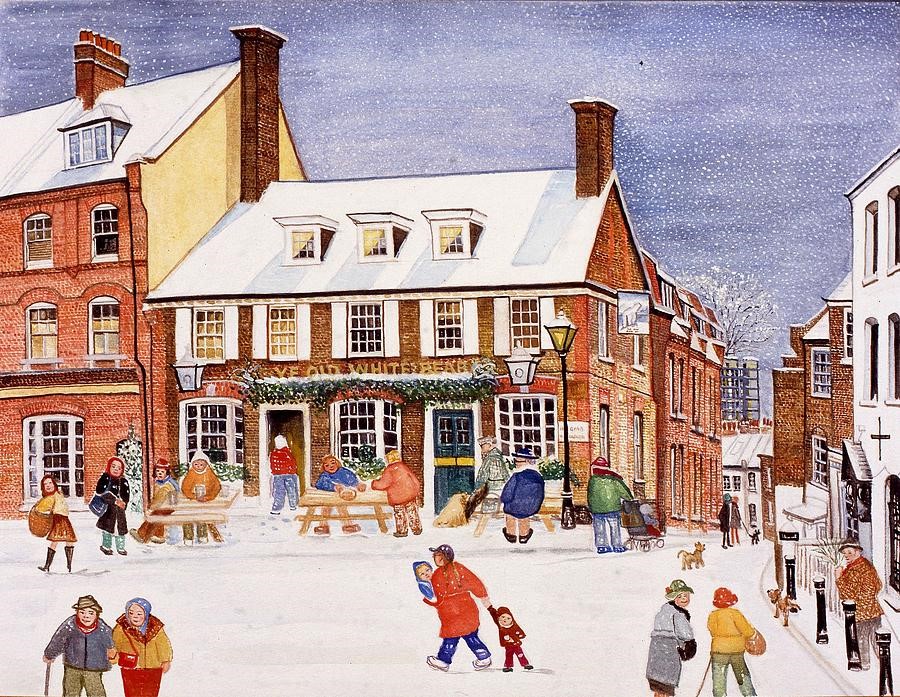
■ Some people claim there is no life outside of NW3, but as much a fan of Hampstead as I am, my first loyalty in London neighbourhoods is firmly lodged in Southwark. (Pimlico is high on the list, too.)
Many will pine for those precious late summer afternoons idly dawdling on the Heath, but Hampstead in winter has its distinct pleasures. For me, it’s curdling up with a pile of books beside the coal fire in the Old White Bear.
In the Christmas issue of The Oldie, Peter York wrote about the rise and fall of arty Hampstead.
■ One of our Hampstead mates is originally a West Country man and now finds himself even further west, studying law in California.
For a New Yorker, California is The Great Other. If not quite a rival, then certainly something we are always being compared against.
Naturally, one looks down on California, but also with a certain envy. If ever America had a golden moment when imperial might was combined with the simple goodness of life, it must have been coastal California from the 1930s to 1960s — with a hint of survival into the 1980s.
California’s decline is evident to all, though its power and influence is still vast (as the iPhone in your pocket proves). The Manhattan Institute recently devoted an entire issue to the question of Can California Be Golden Again?
I haven’t had a chance to read much of it, but I did enjoy Jordan McGillis’s article on how San Diego retains many of the qualities that once made California the envy of the world.
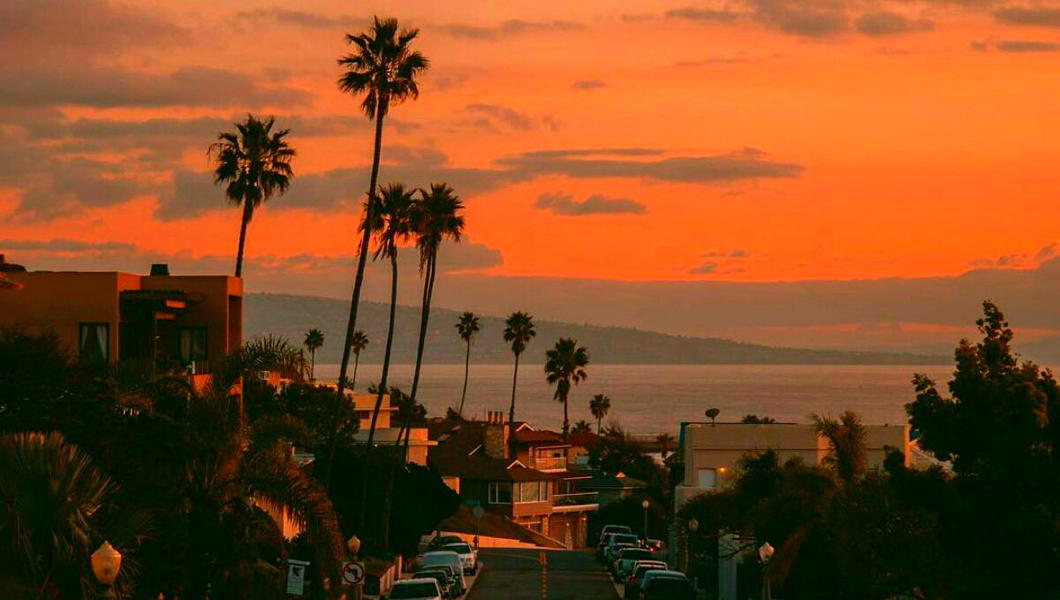
■ Peter Viereck ranks amongst the names of slightly neglected thinkers in the agora of American conservatism. Reading him always brings some insight, but I never knew much about the man himself.
Samuel Rubinstein supplies a fascinating account of the man and his thinking in Peter Viereck: Psychoanalyst of Nazism.
■ National treasure Peter Hitchens has spent his life hating the ogre Ted Heath, destroyer of worlds. I will never forgive him for what he did to England’s ancient counties and boroughs.
But Hitchens the Heath Hater, with his typically thoughtful approach, offers a reconsideration of the man.
■ All politics is local: Fred de Fossard writes about how EU-obsessed Lib Dems are ruining Bath rather than guarding one of the most precious jewels of English cities.
■ We leave you with this six-colour lithograph from the Pretoria-based artist Nina Torr entitled ‘Here we go again’ (an edition of thirty, available from the Artists’ Press):
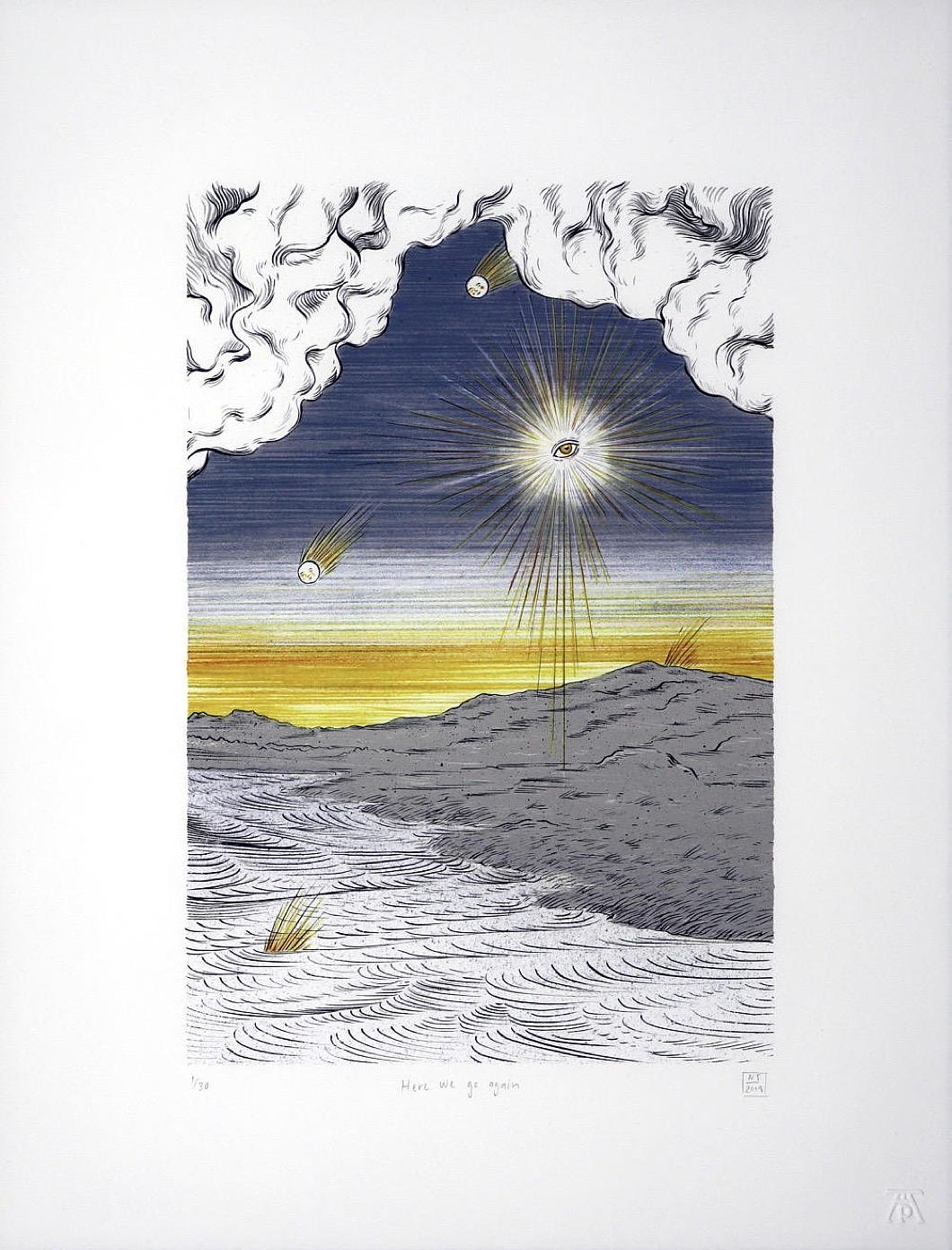
Articles of Note: 6 January 2024

■ I had the great privilege of studying French Algeria under the knowledgeable and congenial Dr Stephen Tyre of St Andrews University and the country continues to exude an interest. The Algerian detective novelist Yasmina Khadra — nom de plume of the army officer Mohammed Moulessehoul — has attracted notice in Angledom since being translated from the Gallic into our vulgar tongue.
Recently the columnist Matthew Parris visited Algeria for leisurely purposes and reports on the experience.
■ While you’re at the Spectator, of course by now you should have already studied my lament for the excessive strength of widely available beers — provoked by the news that Sam Smith’s Brewery have increased the alcohol level of their trusty and reliable Alpine Lager.
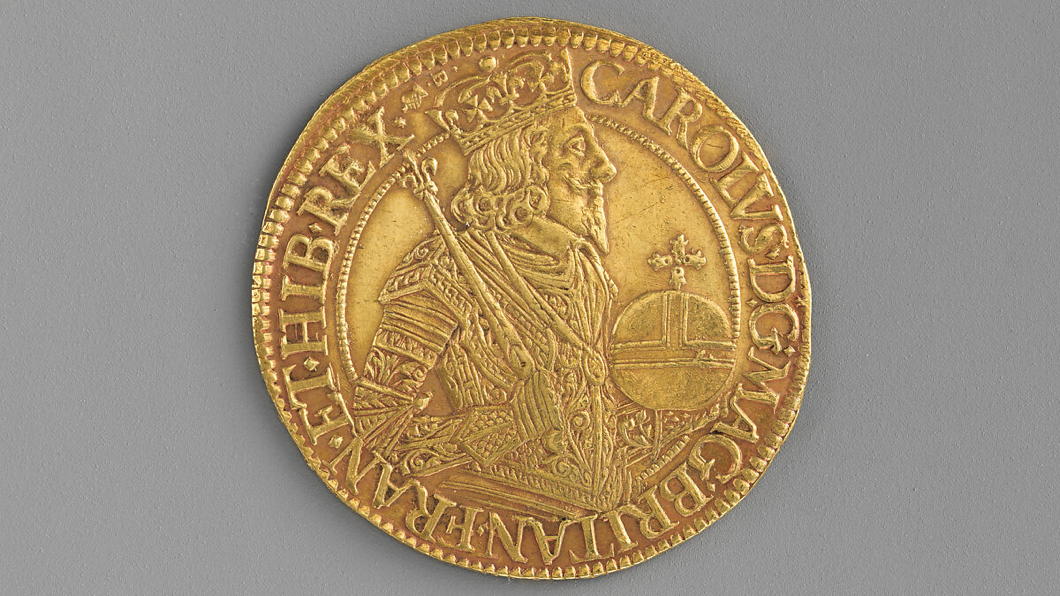
■ This week Elijah Granet of the Legal Style Blog shared this numismatic gem. It makes one realise quite how dull our coin designs are these days. I don’t see why we shouldn’t have an updated version of this for our currently reigning Charles.
■ Meanwhile Chris Akers of Investors Chronicle and the Financial Times has gone on retreat to Scotland’s ancient abbey of Pluscarden and written up the experience for the FT. As he settled into the monastic rhythm, Chris found he was unwinding more than he ever has on any tropical beach.
Pluscarden is Britain’s only monastic community now in its original abbey, the building having been preserved — albeit greatly damaged until it was restarted in 1948. The older Buckfast is also on its original site but was entirely razed by 1800 or so and rebuilt from the 1900s onwards. (Pluscarden also has an excellent monastic shop.)
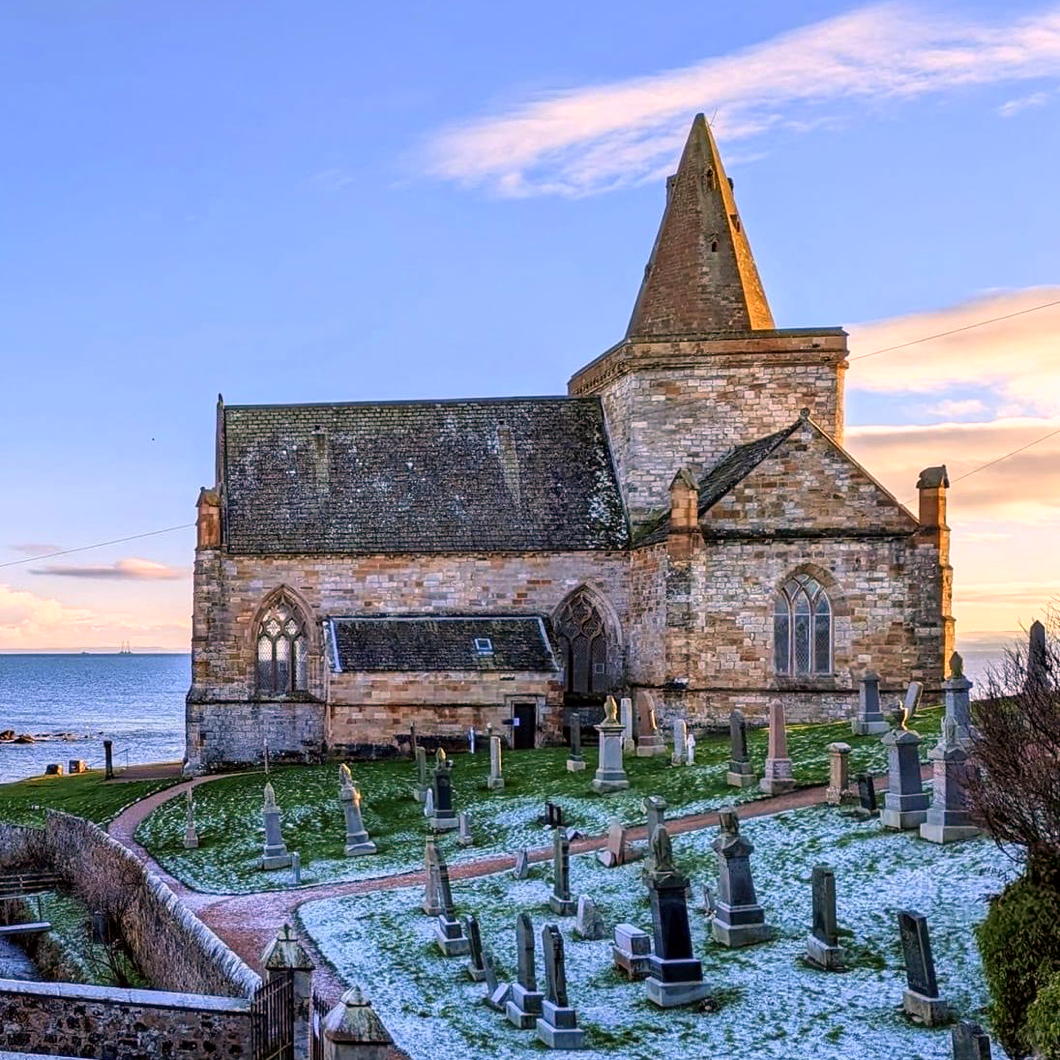
■ An entirely different and more disappointing form of retreat in Scottish religion is the (Presbyterian) state kirk’s decision to withdraw from tons of their smaller churches. St Monans is one of the mediæval gems of Fife, overlooking the harbour of the eponymous saint’s village since the fourteenth century, and built on the site of an earlier place of worship.
Cllr Sean Dillon pointed out the East Neuk is to lose six churches — some of which have been in the Kirk’s hands since they were confiscated at the Reformation, including St Monans.
John Lloyd, also of the FT, reported on this last summer and spoke to my old church history tutor, the Rev Dr Ian C. Bradley. More on the closures in the Courier and Fife Today.
What a dream it would be for a charitable trust to buy St Monans and to restore it to its appearance circa 1500 or so, available as a place of worship and as a living demonstration of Scotland’s rich and polychromatic culture that was so tragically destroyed in the sixteenth century. You could open with a Carver Mass conducted by Sir James MacMillan.
■ And finally, on the last day of MMXXIII, the architect Conor Lynch reports in from Connemara with this scene of idyllic bliss:

Anglo-Gaullist Reading Update
The latest round of news or commentary of Gaullist content or interest:
Mercator: Charles de Gaulle: a wise ruler of France
Financial Times: France invokes the golden age of de Gaulle
Politico: Why all French politicians are Gaullists
Variety: Cliché-Ridden ‘De Gaulle’ is Unworthy of Its Iconic Subject
Articles of Note: 3.II.2022

“Lebanese money was worth more and there was more to eat when militias were fighting each other in the streets of Beirut 40 years ago than there is today.”
One of the great ironies of Lebanon’s current decline (Fernandez points out) is that, as destructive as the Civil War was, the country’s hopes were finally crushed by bankers and politicians rather than warlords.
— A bumper from The European Conservative: Tim Stanley says “Stay away from politics!” (I couldn’t agree less: we need brighter people involved!)
■ Idealists in Europe refusing to bow to reality have provided false hope to countries that have no real prospect of becoming members of NATO or the EU.
Damir Marusic muses on the Ukraine in How Not to Bend the Arc of History.
■ I ran into my friend João at a dinner party last night and he described the very existence of Brazil as “the greatest thing Portugal ever did”.
In 2018, Americas Quarterly claimed the now-deceased Olavo de Carvalho was the most important voice in Brazil’s then-incoming government (even though he didn’t live there).
More bizarrely fascinating is Nick Burns’s 2019 article on Bruno Tolentino, Carvalho, Ernesto Araújo, and the origins of the new Brazilian right.
Brazil’s foreign minister “penned an eyebrow-raising article for Bloomberg in which he blamed Ludwig Wittgenstein for Brazil’s debility on the world stage”.
If you’ve never lived in Latin America (I claim to have been at least partly educated there) you will never really understand quite how different it is.
■ When Algeria became independent, President Ben Bella had spent so long in French prisons that he had almost forgotten his Arabic.
One million French Algerians left within months, as American diplomats in Paris and Algiers at the time recall.
French Algerians “not only controlled the whole private sector, they had all the top government positions, and more importantly, they filled all the minor positions. The guy who read the gas meter in the utility company was a Frenchman. The women who worked the switchboard in the telephone company were all French. So the economy just came to a screeching halt.”
— Ex Africa semper aliquid novi: A new documentary (watchable online) explores Algeria under Vichy while another looks at Jacques Foccart, de Gaulle’s “Mister Africa”.
■ I am not much of a “Substack” aficionado, but I have recently given in and signed up to receive The Postliberal Order in my inbox. It’s penned by the quadrivirate of Vermeule, Deneen, Pappin, and Pecknold — all of whom have become household names in Cusackistan.
Patrick Deneen’s latest contribution on emerging postliberalism amidst the political persuasions of his students is worth a read.
Articles of Note: 23.XI.2020

• France’s Year of de Gaulle has marked the fiftieth anniversary of his death earlier this month and what would have been the general’s one-hundred-and-thirtieth birthday yesterday. Julien Nourian has put together a Weberian analysis of the general and his charismatic mystique.
• President Trump is a very different kind of leader to de Gaulle, and his chances of continuing in the White House are not looking great at the moment. (Our head of legal in New York thinks he’s still got a chance, however.)
Regardless of who will be inaugurated in January of next year, Trump managed to win the highest proportion of minority votes of any Republican candidate since 1960 (when the GOP choice was a member of the NAACP). Meanwhile, Trump lost votes among old, white, well-to-do men.
What is the future of American political conservatism? Ben Hachten points out It’s Not Your Father’s GOP.
New England poli-sci professor Darel E. Paul explores The Future of Conservative Populism, pointing out the big increase in the Hispanic vote for Trump — especially Hispanics living in Texas along the Mexican border.
• In Britain, Ferdie Rous says the Conservative party is having difficulty reconciling the business wing of the party with our rural roots, but suggests that The writings of Lewis and Tolkien embody conservative environmentalism.
Meanwhile David Skelton asserts It was working class voters who delivered this majority – and Johnson must not abandon them now.
• Here in London we’re still in the middle of the second lockdown. Instead of following the science, governments around the world are implementing the exact opposite of effective measures to combat the pandemic. It’s The Greatest Scandal of Our Lifetime according to R.J. Quinn.
• We can always do a with a dose of Metternich and Wolfram Siemann’s 900-page doorstop has provided a chance for many to analyse the master diplomat. Ferdinand Mount examines The Prime Minister of the World.
• And finally, the Museum of Literature Ireland features an online exhibition on the American writer, speaker, reformer, and statesman Frederick Douglass’s visit to Ireland 175 years ago. (Available as Gaeilge too.)
Articles of Note: 22.XI.2019

• In Spiked, James Heartfield urges us to spurn Labour’s counsel and instead stop apologising for the past.
• Michael Brendan Dougherty in National Review wonders if Republican Missouri senator Josh Hawley might be the next Daniel Patrick Moynihan.
• Why would an Eton- and Oxford-educated man assert he ‘supports’ Aston Villa, a football team based in a slum in Birmingham, a city with which he has no connection? Theodore Dalrymple ponders David Cameron’s Big Lie at Law & Liberty.
• At the American Conservative, Rod Dreher ponders the radicalism of today’s left and whether its religious fervour to deny scientific realities like biological sex is driving Trump-hating lefties to back the Donald for president.
• And, for a decent long read, politics professor Daniel E. Burns examines how critics and defenders of liberalism often argue past one another:
It refers, on the one hand, to a set of political practices, and on the other hand, to a political theory that purports to explain those practices. Defenders of liberalism are thinking first and foremost about liberal political practice, which they (almost all) defend by drawing selectively on liberal theory. Critics of liberalism are thinking first and foremost about liberal political theory, which they (almost all) attack by pointing selectively to liberal practice.
In National Affairs, it’s a question of Liberal Practice v. Liberal Theory.
Around
“By contrast, Hungary’s 100,000 Jews—a larger presence relative to the country’s population of 8 million—walk unmolested to synagogue in traditional Jewish costume and hold street fairs with minimal security presence.” The Real Modern Anti-Semitism
No American writer has wielded such influence, John Rossi writes. So why is he so little known today? The Strange Death of H.L. Mencken
Damon Searl on Uwe Johnson: The Hardest Book I’ve Ever Translated.
Then there are the mythical and miraculous islands of the medieval Atlantic
120 years after the Spanish-American War, here are five books to help you better understand American imperialism.
The always-worth-reading Michael Brendan Dougherty explores what the Catholic traditionalists of the 1960s and 1970s were thinking. (More people, however, are talking about his look at Francis’s record as pope.)
In Manhattan, John Massengale suggests there are better ways to get around town.
Argentina’s most beloved bibliophile Alberto Manguel on the great books that are now lost to history.
In Hungary, like everywhere else, people are marrying later, with demographic consequences. Or is this changing? The country is not just experiencing a fertility spike, Lyman Stone reports. Hungary is winding back the clock on much of the fertility and family-structure transition that demographers have long considered inevitable. Is Hungary Experiencing a Policy-Induced Baby Boom?
Speaking of which, from the same author, what about Poland’s Baby Bump?
Meanwhile in New England, an entitled Harvard academic pulls rank on the mother and child living in an affordable unit in their apartment building in a telling tale of class and hierarchy in America.
Interesting Things Elsewhere
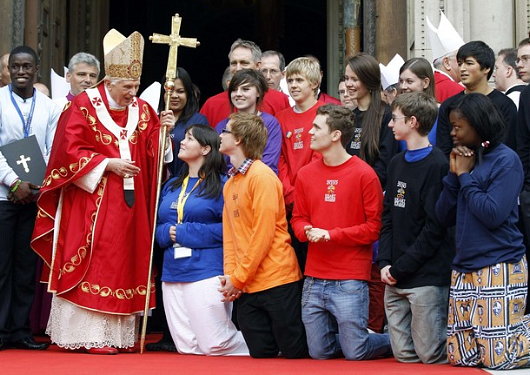
Benedict and Britain
The papal visit began in Scotland, and the smaller setting (Scotland has just five million people, fewer than London alone) proved a wiser starting point of the pontiff’s trip to Great Britain. “Would the first day have been the success it was if it had taken place in England?” asked William Oddie. “Would the papal chemistry have worked so soon in London, that vast and engulfing megalopolis, if the reception by Her Majesty had taken place in the impersonal splendours of Buckingham palace rather than in that ancient architectural wonder Holyrood house (whose very stones are a testimony to its Catholic origins) and if the Popemobile ride through the streets afterwards had been down the Mall?”
Damian Thompson has argued that the papal visit has proved a triumph for Benedict and a humiliation for the secular-humanist crowd. The Daily Telegraph blogs editor and Catholic Herald editor-in-chief says that the Pope’s natural shyness has worked to his advantage, while the former Spectator editor Dominic Lawson argued in the Independent that Benedict’s unpolitical nature gives him a popular appeal.
The volume and biliousness of the media’s campaign against Benedict XVI has actually backfired and turned the lukewarm into pope-welcomers (like Kate Hoey MP, reports Christina Odone). Another blogger reported the influence a television programme produced by the gay activist and sometime paedophilia sympathiser Peter Tatchell that was broadcast just before the Pope’s arrival:
‘Are you going tomorrow?’ I asked. ‘Yes, I am,’ she replied. ‘I wasn’t going to at first, because it’s a long day, but when I saw that rubbish last night on the telly, I changed my mind. I’m don’t care if I die there; I’m going.’
Meanwhile Mark Dowd, another homosexual, was determined to be even-handed in his documentary “Benedict: Trials of a Pope”, and his broadcast was well-received. The filmmaker wrote in the Catholic Herald “when you have to make a one-hour programme on one of the most clever and gifted people on the planet you have to look behind the headlines and the angry rants on the blogosphere. In short, you have to do justice to the man as best as you can.”
Hilary White had a chat with barrister and Catholic Union chairman Jamie Bogle, who argued that the visit has taken the wind out of the sails of Benedict’s enemies.
“Jamie also pointed out that the protesters were having a bit of fun with the numbers,” Hilary writes. “A friend in Vancouver said that 25,000 turned out for the demonstration. The National Secular Society said it was ‘between 10 and 12,000’. But Jamie told me he had spoken with some of the cops present, and they said it was no more than 2,000.”
It was like a scene from 1984
Atheist Brendan O’Neill reported being disturbed by the anti-papal demonstrators, reporting that there is “a sharp authoritarian edge” to the radical pope-haters. “Things turned ugly outside Downing Street when Terry Sanderson of the National Secular Society branded the pope an ‘enemy of the state’, giving rise to the cacophonous chant: ‘GO HOME POPE, GO HOME POPE.’ It was like a scene from 1984. I have been on many a radical demo that has challenged the branding of some group or individual as ‘enemies of the state’; but this is the first radical demo I’ve been on where the protesters themselves demanded the silencing and even expulsion from Britain of someone they decreed to be an ‘enemy of the state’. Even one-time ‘enemies of the state’ – the so-called queers and the old left – were using that criminalising phrase, that piece of political demonology, to chastise the pope. It was the world turned utterly upside down.”read more
Also: The campaigners against the pope’s visit have more in common with the fanatical Inquisitors of old than with Enlightened liberal humanists, says Frank Furedi.
The conservative case for rail
File this one under “things we always knew and are glad someone agrees”: the dissident conservative fortnightly The American Conservative presents a symposium of articles about getting the USA back on the rails. William Lind attempts to destroy the myth of public-transport-hating conservatives while attacking the rampant subsidisation of federal highways. Former Milwaukee mayor John Norquist says the Right shouldn’t surrender the cities to the Left. Glen Bottoms does the numbers on the return to rail and tries to figure out how much it will cost. Finally, John Robert Smith argues that there’s still some life in America’s Main Streets. Christopher Leinberger discusses how private development can fund public infrastructure. read more
The Thomist constitution
St. Thomas Aquinas, the “Dumb Ox”, stated that “all should take some share in the government: for this form of constitution ensures peace among the people, commends itself to all, and is most enduring”. Aelianus muses on a Thomistic view of government, explores the pros and cons of monarchy, aristocracy, democracy, and ponders the political position of the family in society. read more
Swedish under threat in Finland
Swedish was historically the language of Finland’s nobility and intelligentsia, as well as of the country’s ethnic Swedish minority — Finland’s first president and greatest hero, Field Marshal Mannerheim, could barely even speak Finnish. But while the Scandinavian land is still officially bilingual in education and government, the 5.5% of the population who are Swedish-Finns is increasingly viewed as “the world’s most pampered minority”. read more
The Südtirol success story
Amid the warnings of doom and gloom ahead for the Italian economy, one province has almost full employment and a healthy economy, not to mention a governor who has ruled for over twenty years. “We are living in the promised land,” — Südtirol. read more
Interesting Things Elsewhere
This determined Celt is gunning for Thabo
Kevin Bloom | The Daily Maverick
Ireland’s 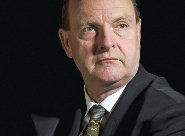 Paul O’Sullivan took over as head of security at South Africa’s airport authority in 2001, and discovered something was wrong from the start: why didn’t the policeman on duty want to take a statement about the attempted theft of his baggage? Since then, his life has been a series of bizarre events leading him ever deeper into the most complex criminal network of the post-apartheid era, including the recent the trial and conviction of former national police chief Jackie Selebi. But O’Sullivan’s determined quest to expose crookedness isn’t over yet, and he now has former president Thabo Mbeki in his sights. read more
Paul O’Sullivan took over as head of security at South Africa’s airport authority in 2001, and discovered something was wrong from the start: why didn’t the policeman on duty want to take a statement about the attempted theft of his baggage? Since then, his life has been a series of bizarre events leading him ever deeper into the most complex criminal network of the post-apartheid era, including the recent the trial and conviction of former national police chief Jackie Selebi. But O’Sullivan’s determined quest to expose crookedness isn’t over yet, and he now has former president Thabo Mbeki in his sights. read more
The apparatus of state will simply ignore the government
‘Inspector Gadget’ | Police Inspector Blog
Police across England were told by the responsible minister of the democratically elected government that they must not chase performance targets any longer. “I can also announce today that I am also scrapping the confidence target,” said the Home Secretary, Theresa May, “and the policing pledge with immediate effect”. But the ‘senior management team’ of the West Yorkshire Police have stated they will go on no matter what the government says. read more
Has Christian Democracy reached a dead end?
Jan-Werner Mueller | Guardian.co.uk
The commentator completes a brief survey of the struggles of Christian Democracy in Germany and Europe today. The French leader Georges Bidault claimed that Christian Democracy meant “to govern in the centre, and pursue, by the methods of the right, the policies of the left”. But Christian Democracy’s brief French moment in the 1950s didn’t survive the return of de Gaulle, and Christian Democratic parties on the continent today face an existential crisis. read more
Also: Monsignor Ignacio Barreiro’s talk at the Roman Forum’s 2010 Summer Symposium, entitled The Problem of Christian Democracy will be made available online in audio form sometime in the coming months.
Deep in Shanxi, the most Catholic village in China
Anthony E. Clark | Ignatius Insight
Church after church dot the landscape and high steeples rise above small villages as they do in southern France. Passing through a narrow side road one arrives and is welcomed by three great statues at the village entrance: St. Peter holding his keys is flanked by Saints Simon and Paul. Thirty minutes before Mass the village loudspeakers, once airing the revolutionary voice of Mao and Party slogans, now broadcasts the rosary. Welcome to Liuhecun, the most Catholic village in China. read more
Look for me in the Cotswolds.
Dino Marcantonio
The apologists for modernist architecture have tried for a century to gain public acceptance of and appreciation for their horrors. While the elites have almost overwhelmingly been converted, the general populace around the world still sees that the Emperor has no clothes, and almost always prefers architecture that reflects the tried and true, the local and the natural. Alain de Botton, the Swiss essayist, ‘pop philosopher’, and former ‘writer-in-residence’ at Heathrow Airport, is the latest to give it a go, this time in the pages of the modernist Architectural Record. Dino Marcantonio provides a most useful fisking. read more
Canada is a French country
Andrew Coyne | Maclean’s
At the recent Canada Day celebrations on Parliament Hill, Canadian PM Stephen Harper spoke of “the steadfast determination and continental ambition of our French pioneers, who were the first to call themselves ‘Canadians.’” At other times he has spoken of Canada as having been “born in French,” of French as “Canada’s first language,” and, most famously, of Quebec City as “Canada’s first city,” its founding in 1608 as marking “the founding of the Canadian state.” While the sentiment may seen anodyne, moreover, the implications are radical. read more
Interesting Things Elsewhere
Copernicus re-buried: an interesting but misleading story
Phil Lawler | catholicculture.org
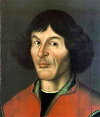 An interesting AP story is making the rounds this week, reporting that the Catholic Church has finally given due honors to Copernicus. Unfortunately the story is chock-full of statements that are severely misleading if not downright wrong. Start with the opening sentence… read more
An interesting AP story is making the rounds this week, reporting that the Catholic Church has finally given due honors to Copernicus. Unfortunately the story is chock-full of statements that are severely misleading if not downright wrong. Start with the opening sentence… read more
Britannia still rules the waves
Rian Malan | The Daily Telegraph
Natal was founded in the early 1840s by Sir Benjamin d’Urban on a stretch of elephant-infested bush. Some would say d’Urban stole the land from the Zulu kingdom, but the occupiers of record in 1843 were Boer Voortrekkers, who reloaded their ox wagons and headed back into the wild interior rather than submit to Queen Victoria. English-speaking Natalians heaved a sigh of relief and proceeded to turn their territory into a shrine to straight bats, and stiff upper lips. read more
Sarkozy’s arch rival Dominique de Villepin sets up rival party
conservativehome
 Dominique de Villepin, the eloquent opponent of the Iraq war and leader of the anti-Sarkozist centre-right in France, has set up a new political movement to bring the French right back to its sense. De Villepin used the launch to attack France’s involvement in the Afghan debacle, and Sarkozy’s decision to bring France back into the NATO military structure. ConservativeHome’s International section writes about the new movement with a sceptical eye. read more
Dominique de Villepin, the eloquent opponent of the Iraq war and leader of the anti-Sarkozist centre-right in France, has set up a new political movement to bring the French right back to its sense. De Villepin used the launch to attack France’s involvement in the Afghan debacle, and Sarkozy’s decision to bring France back into the NATO military structure. ConservativeHome’s International section writes about the new movement with a sceptical eye. read more
Amadeo Guillet
Obituary | The Daily Telegraph
 Daybreak on January 21, 1941: 250 horsemen erupted through the morning mist at Keru, cut through the 4/11th Sikhs, flanked the armoured cars of Skinner’s Horse and then galloped straight towards British brigade headquarters and the 25-pound artillery. At a distance of 25 yards they fired, cutting swathes through the galloping horses but also causing mayhem as the shells exploded amid the Sikhs and Skinner’s Horse. After a few more seconds the horsemen disappeared into the network of wadis that criss-crossed the Sudan-Eritrean lowlands. read more
Daybreak on January 21, 1941: 250 horsemen erupted through the morning mist at Keru, cut through the 4/11th Sikhs, flanked the armoured cars of Skinner’s Horse and then galloped straight towards British brigade headquarters and the 25-pound artillery. At a distance of 25 yards they fired, cutting swathes through the galloping horses but also causing mayhem as the shells exploded amid the Sikhs and Skinner’s Horse. After a few more seconds the horsemen disappeared into the network of wadis that criss-crossed the Sudan-Eritrean lowlands. read more
Are Czechs the least religious of all?
Dana Hamplová | guardian.co.uk
This claim is usually based on the sociological surveys and census data which show that only a small proportion of Czechs goes regularly to church and that most of the Czech Republic’s population does not report even a formal affiliation to any church. But the idea that Czechs are almost completely indifferent to any religion is not accurate. read more
Search
Instagram: @andcusack
Click here for my Instagram photos.Most Recent Posts
- Burns Tower April 19, 2024
- Patrick in Parliament March 18, 2024
- Articles of Note: 13 March 2024 March 13, 2024
- Cambridge March 9, 2024
- Taken on Trust March 4, 2024
Most Recent Comments
Book Wishlist
Monthly Archives
Categories


